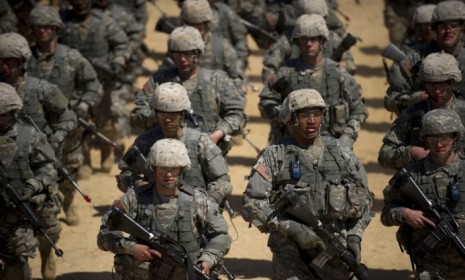Thrill-kill casualties: Should the Army release the photos?
The Army is trying to avoid a repeat of the Abu Ghraib backlash by locking up pictures of the Afghan civilians U.S. soldiers allegedly killed "for sport"

A free daily email with the biggest news stories of the day – and the best features from TheWeek.com
You are now subscribed
Your newsletter sign-up was successful
With five U.S. soldiers accused of murdering unarmed Afghan civilians, the Army is "scrambling to locate dozens of digital photographs" allegedly showing the defendants posing next to the victims' corpses. Military commanders worry that if the images are leaked, they will inflame stateside public opinion against the war, and incite attacks on American troops abroad. Should the Army keep the photos hidden, or does the public have the right to see them?
The military needs to avoid a repeat of Abu Ghraib: The "power of photos to stir up anti-American sentiment" was made clear in 2004 when images showing abused Iraqis at Abu Ghraib prison went public, says Hal Bernton at The Seattle Times. Military leaders know they can't afford to "anger Afghan civilians at a time the United States is trying to win support for a counterinsurgency campaign against the Taliban."
"Army restricts access to photos of soldiers with Afghan corpses"
The Week
Escape your echo chamber. Get the facts behind the news, plus analysis from multiple perspectives.

Sign up for The Week's Free Newsletters
From our morning news briefing to a weekly Good News Newsletter, get the best of The Week delivered directly to your inbox.
From our morning news briefing to a weekly Good News Newsletter, get the best of The Week delivered directly to your inbox.
The U.S. cover-up is shameful: Washington is all for publicizing "vicious" attacks when they're committed by the Taliban, say the editors of Pakistan's Daily Mail, but it does everything it can to hide the truth when it comes to American atrocities like the alleged murder of civilians for sport. This "double standard" puts America's political interests ahead of its concern for "the value of human lives."
"Double standards of United States"
The Army cannot hide these photos forever: Defense lawyers have been ordered to return copies of the photos, including some showing soldiers holding up the heads of dead Afghans, says Justin Elliott at Salon, on the grounds that their release could prevent a fair trial and damage the reputation of U.S. armed forces. But government secrecy experts say that, under the Freedom of Information Act, the military probably can't "keep the pictures secret indefinitely."
"Will grisly Afghan corpse photos be released?"
A free daily email with the biggest news stories of the day – and the best features from TheWeek.com
-
 Tourangelle-style pork with prunes recipe
Tourangelle-style pork with prunes recipeThe Week Recommends This traditional, rustic dish is a French classic
-
 The Epstein files: glimpses of a deeply disturbing world
The Epstein files: glimpses of a deeply disturbing worldIn the Spotlight Trove of released documents paint a picture of depravity and privilege in which men hold the cards, and women are powerless or peripheral
-
 Jeff Bezos: cutting the legs off The Washington Post
Jeff Bezos: cutting the legs off The Washington PostIn the Spotlight A stalwart of American journalism is a shadow of itself after swingeing cuts by its billionaire owner